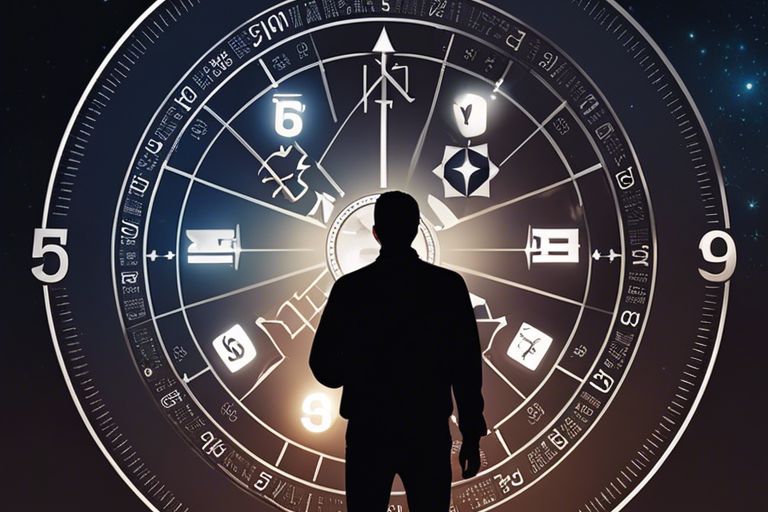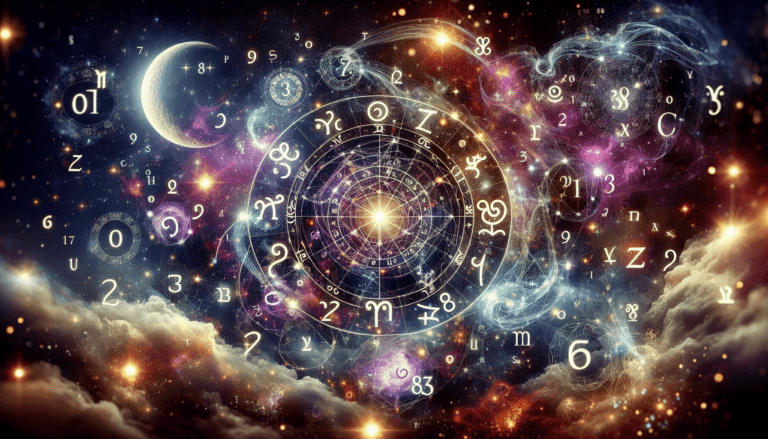Why Numerology is Wrong: Debunking the Pseudoscience Myths
Have you ever had your numerology chart done? Maybe you found yourself intrigued by the idea that your birthdate and name could hold the key to your future. However, you might be surprised to know that numerology is considered a pseudoscience. In this article, we’ll explore the myths associated with numerology and explain why it is wrong.
Despite its popularity, numerology lacks empirical evidence and relies on vague concepts and symbolism, making it highly subjective. There is little to no scientific evidence supporting the claims of numerology, and the predictive accuracy of numerological readings is extremely low.
Don’t be fooled by the claims of numerology practitioners who use cold reading techniques and subjective interpretations to make vague generalizations appear accurate. In this article, we will provide a critical analysis of numerology and present a rational argument against its validity.
Key Takeaways:
- Numerology is considered a pseudoscience.
- Numerology lacks empirical evidence and relies on vague concepts and symbolism, making it highly subjective.
- There is little to no scientific evidence supporting the claims of numerology, and the predictive accuracy of numerological readings is extremely low.
- Practitioners use cold reading techniques and subjective interpretations to make vague generalizations appear accurate.
- A rational argument can be made against the validity of numerology.
What is Numerology?
Numerology is a belief system that assigns significance to numbers and their relationships with people’s personalities, traits, and life events. Proponents of numerology believe that numbers can reveal a person’s destiny, compatibility with others, and even their future. However, while numerology may seem like a fascinating and alluring concept at first, it is important to understand its flaws and limitations.
Contrary to popular belief, numerology is not a science and does not have any empirical evidence to support its claims. Despite this, some people consider numerology a valid tool for self-discovery and decision-making.
It’s important to understand that there are many misconceptions about numerology. For example, numerology practitioners use a person’s birthdate, name, and other personal information to calculate their life path number, which is believed to reveal information about their personality. However, this calculation method is not standardized, and different practitioners may use different methods, leading to inconsistencies.
Furthermore, while numerology claims to offer insight into people’s personalities and life events, its predictions are often vague and generalized. For example, a numerology reading may state that a person is prone to being independent and creative, but these traits could apply to many individuals.
Overall, while numerology may be intriguing, it is important to approach it with a critical mindset and understand its limitations. In the following sections, we will delve deeper into the logical flaws, lack of scientific evidence, and misleading claims of numerology, and provide a rational argument against its validity.
The Logical Flaws in Numerology
Numerology claims to provide insight into your personality, behavior, and future based on numbers derived from your name and birth date. However, a critical analysis of numerology reveals several logical flaws that question its validity as a science.
The Lack of Empirical Evidence
There is a lack of empirical evidence supporting the accuracy of numerology. Despite some anecdotal evidence suggesting its validity, there is no consistent or rigorous study that proves numerology’s claims. In contrast, scientific theories and practices are based on rigorous testing and repeatable results.
The Subjective Nature of Interpretations
Numerology relies on subjective interpretations of numbers and symbols. The calculations and meanings of numbers vary depending on the system used and the practitioner’s interpretation. This subjectivity can lead to different results and contradicting interpretations, limiting the reliability and consistency of numerology’s claims.
The Reliance on Vague Concepts and Symbolism
Numerology often uses vague and ambiguous concepts and symbolism to make general statements about a person’s personality and future. The interpretations rely on the practitioner’s judgment and creativity, rather than an objective and empirical approach. This ambiguity can lead to broad and irrelevant statements that seem accurate due to the Barnum effect, where people tend to accept general statements as applicable to themselves.
Overall, numerology’s logical flaws undermine its claims as a science and suggest it should be approached with skepticism. Critical thinking and empirical evidence are essential to evaluate the accuracy and validity of any practice, including numerology.
Lack of Scientific Evidence Against Numerology
Despite the claims made by numerology practitioners, there is no scientific evidence to support the validity of their methods. Despite its popularity, research on numerology is limited, and the studies that do exist have failed to produce consistent results. The lack of empirical evidence raises serious doubts about the accuracy of numerological predictions and the legitimacy of the practice.
There is no established scientific theory that explains how numerology works, and there are no discernible patterns or correlations in the data that support its claims. Additionally, the variables used in numerological calculations are often arbitrary, and the results are highly subjective. Numerology relies on vague concepts and symbolism, making it difficult to validate or refute its findings.
It is worth noting that anecdotal evidence and personal experiences cannot be taken as scientific proof. The human mind is naturally inclined to see patterns and coincidences, and this tendency can often lead to the perception of accuracy where none exists. Thus, it is important to remain skeptical of numerological claims and seek more reliable sources of information.
Debunking Numerological Predictions
Numerology claims to provide accurate predictions about an individual’s future based on their birthdate or name. However, a critical analysis of numerological predictions reveals several flaws in its methodology.
Firstly, numerology fails to take into account numerous variables that can impact a person’s life and future. This includes but is not limited to the environment, upbringing, education, career choices, personal values, and relationships. Therefore, the limited parameters used in numerology cannot provide an accurate prediction of a person’s future.
Secondly, numerology relies on vague concepts and symbols to make predictions, making it difficult to validate the outcomes. Practitioners often use broad statements that apply to most people to avoid being proven wrong.
Thirdly, the lack of empirical evidence supporting the accuracy of numerological predictions gives rise to serious doubts about its validity. The absence of scientific studies and the heavy reliance on anecdotal evidence further undermines the credibility of numerology.
In conclusion, the flaws in numerological predictions make it an unreliable and unscientific practice for predicting a person’s future. It is worth being skeptical and relying on more reliable sources of information if you want to make informed decisions about your life.
The Appeal and Misleading Claims of Numerology
Have you ever found yourself drawn to numerology and its promise of hidden meanings and guidance? The allure of patterns and coincidences can be hard to resist, especially when you’re searching for answers. However, it’s essential to recognize the misleading claims of numerology and the flaws in its predictions.
Numerology makes broad generalizations that apply to most people, relying on subjective interpretations to make readings seem more accurate. It’s easy to fall prey to confirmation bias, where you focus on confirming evidence while ignoring contradictory information, leading to a skewed perception of accuracy.
It’s crucial to recognize that numerology lacks scientific evidence to support its claims. The absence of rigorous studies, the reliance on anecdotal evidence, and the failure to produce consistent results are all red flags. Rational thinking requires us to look critically at the evidence presented and question the validity of numerology.
Alternative explanations for the perceived accuracy of numerological claims exist. For example, the Forer effect explains how people tend to accept vague and general statements as accurate descriptions of themselves. Additionally, the Barnum effect explains how people tend to accept statements that are true for almost everyone as specific to them. These effects can lead to the illusion of accuracy in numerology.
In conclusion, while numerology may seem appealing, it’s essential to recognize the flaws in its predictions and interpretations. Confirmation bias, subjective interpretations, and the lack of empirical evidence all point to its invalidity as a reliable source of guidance. Remaining skeptical and relying on more reliable sources of information is crucial to making informed decisions about your life.
The Influence of Confirmation Bias in Numerology
When it comes to numerology, confirmation bias can play a significant role in shaping people’s perceptions of its accuracy. Confirmation bias is the tendency to search for, interpret, and recall information in a way that confirms one’s pre-existing beliefs or expectations while ignoring or dismissing contradictory information.
In numerology, people may focus on the instances where a numerological prediction seems to come true while ignoring the many times it fails to do so. They may also interpret vague statements in a way that fits their desired outcome, rather than critically evaluating the accuracy of the statement.
It’s important to be aware of confirmation bias when evaluating the validity of numerology. By recognizing the influence of confirmation bias, you can approach numerological claims with a more critical eye and make more informed decisions based on evidence, rather than personal biases.
The Role of Cold Reading and Subjective Interpretations
In numerology, practitioners often use cold reading techniques to make their readings appear accurate. They rely on making generalized statements that could apply to most individuals and interpret them subjectively to fit the person’s situation. For example, numerologists may use the number seven to describe someone as spiritual, introspective, and analytical. These traits could apply to many people, yet the numerologist interprets them based on the person’s responses, body language, or appearance to make the reading appear more specific.
Subjective interpretations also play a significant role in numerology. A numerologist’s interpretation relies heavily on their personal biases, beliefs, and experiences, which can make the reading more of a reflection of the numerologist than the person seeking the reading. This subjectivity can lead to readings that are inaccurate, unhelpful, or even harmful.
Rational Argument Against Numerology
After examining the logical flaws, lack of scientific evidence, misleading claims, and flawed predictive accuracy of numerology, it’s clear that this practice is not a reliable source of information. While it may seem appealing to rely on patterns and coincidences to make sense of your life, it’s important to approach any claims with critical thinking and a healthy dose of skepticism.
The lack of empirical evidence supporting numerology’s accuracy should be a red flag for anyone seeking guidance. In the absence of rigorous studies, it’s difficult to accept numerology’s claims as anything more than anecdotal evidence. Additionally, the sheer number of variables ignored in calculations and the inability to validate outcomes should give pause to anyone looking for reliable answers.
The use of cold reading techniques and subjective interpretations only adds to the skepticism surrounding numerology. By relying on general statements that apply to most individuals and personal interpretations, practitioners can make their readings seem accurate without providing any actual evidence or proof.
Ultimately, it’s important to remember that correlation does not equal causation, and the confirmation bias can lead people to focus on confirming evidence while ignoring contradictory information. Instead of relying on numerology, it’s better to engage in critical thinking and use more reliable sources of information to make informed decisions about your life.
Conclusion
In conclusion, numerology is a pseudoscience that lacks the empirical evidence and logical consistency required to be considered a valid practice. Throughout this article, we have debunked the myths associated with numerology, explored its logical flaws, and highlighted the absence of scientific evidence supporting its claims.
While numerology may appeal to those seeking answers and guidance, it is important to approach it with skepticism and critical thinking. The use of cold reading techniques, subjective interpretations, and confirmation bias can lead to a biased perception of accuracy.
It is crucial to rely on more reliable sources of information, such as scientific studies and established fields of knowledge, when seeking answers about life, relationships, and other aspects of existence. By avoiding pseudoscientific practices such as numerology, we can enhance our understanding of the world and make more informed decisions in our lives.
FAQ
Q: Why is numerology considered wrong?
A: Numerology is considered wrong because it lacks scientific evidence, relies on subjective interpretations, and has logical flaws in its calculations.
Q: What is numerology?
A: Numerology is a belief system that assigns meanings to numbers and calculates their influence on a person’s life, often used to make predictions and reveal personality traits.
Q: What are the logical flaws in numerology?
A: Numerology has logical flaws such as the lack of empirical evidence, subjective interpretations, and reliance on vague concepts and symbolism.
Q: Is there scientific evidence against numerology?
A: There is a lack of scientific evidence supporting the claims of numerology, as rigorous studies are absent and the reliance on anecdotal evidence fails to produce consistent results.
Q: Can numerology accurately predict the future?
A: Numerological predictions lack accuracy due to the large number of variables ignored in calculations and the inability to validate the outcomes.
Q: Why does numerology appeal to people?
A: Numerology appeals to people due to the desire for answers and guidance, the allure of patterns and coincidences, and the inability to discern causation from correlation.
Q: How does confirmation bias influence numerology?
A: Confirmation bias leads people to focus on confirming evidence while ignoring contradictory information, creating a biased perception of numerological accuracy.
Q: What role do cold reading and subjective interpretations play in numerology?
A: Practitioners of numerology use cold reading techniques and subjective interpretations to make general statements that apply to most individuals and make their readings seem accurate.
Q: What is the rational argument against numerology?
A: The rational argument against numerology emphasizes the need for empirical evidence, critical thinking, and alternative explanations for the perceived accuracy of numerological claims.
Q: Can numerology be considered a reliable source of information?
A: Based on its logical flaws, lack of scientific evidence, and misleading claims, numerology should be approached with skepticism, and more reliable sources of information should be relied upon.






